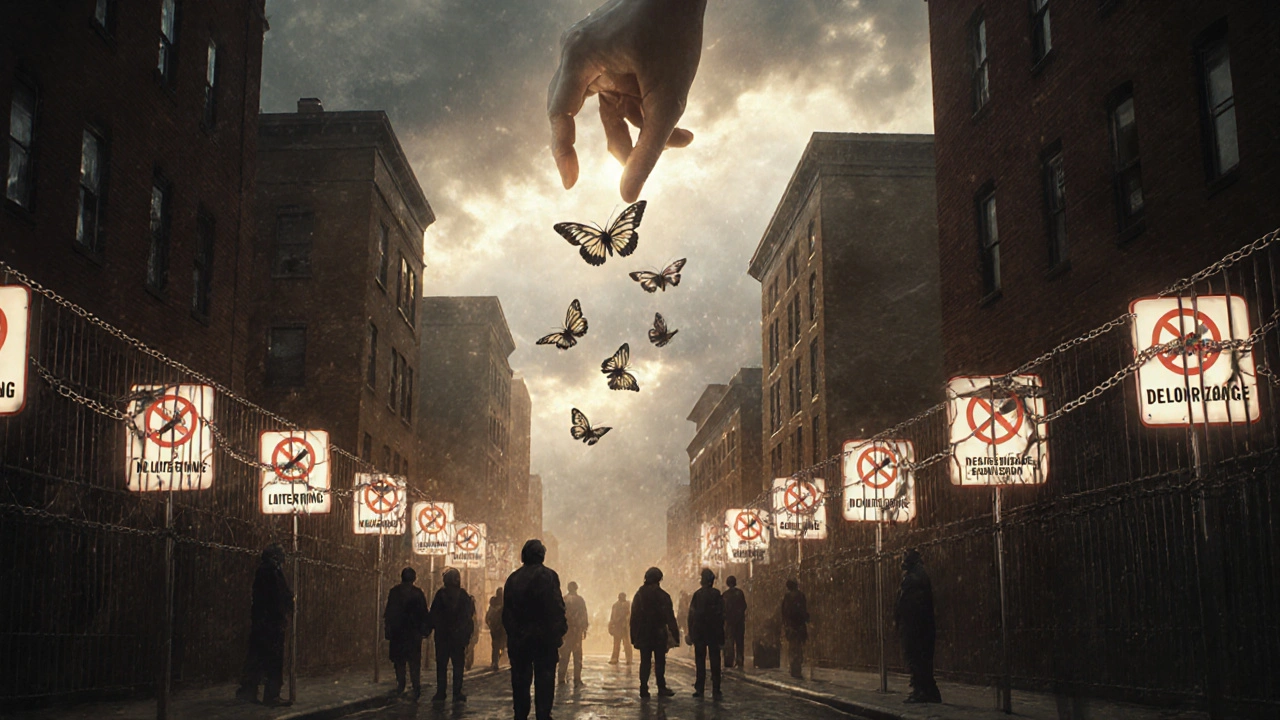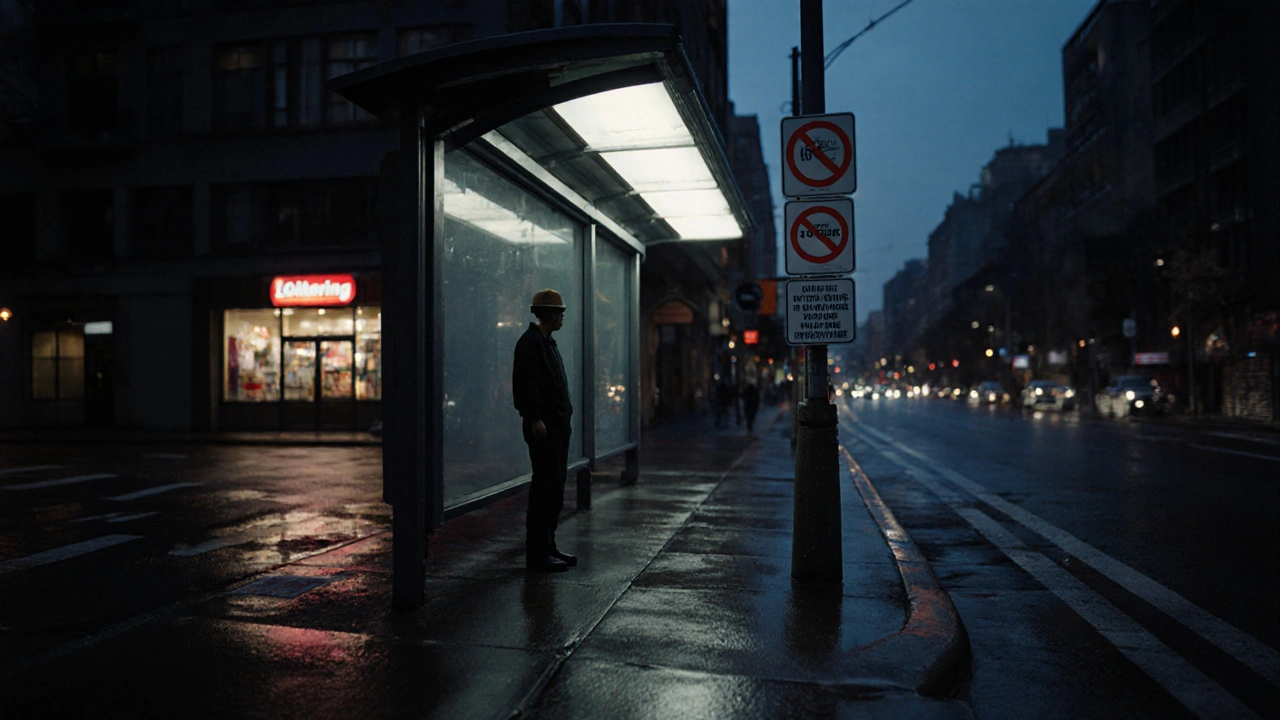Every city has them-signs that say loitering is prohibited, or areas marked as prostitution-free zones. In Perth, you’ll see them near bus stops, under bridges, and outside convenience stores. In Toronto, they stretch along certain blocks of Queen Street. In Berlin, they appear near train stations. These zones aren’t just about keeping streets clean. They’re tools used to push sex workers out of public view-and often, out of safety.
It sounds simple: no loitering, no soliciting. But for sex workers, these laws don’t stop crime. They make survival harder. A 2023 study by the Global Network of Sex Work Projects found that in cities with strict loitering laws, sex workers were 3.5 times more likely to experience violence. Why? Because they’re forced to move to isolated areas, work faster, and avoid reporting abuse for fear of arrest.
What Exactly Are Loitering and Prostitution-Free Zones?
Loitering laws don’t define what loitering means. They don’t say how long you can stand somewhere. They just say if you’re seen as "suspicious"-often based on appearance, location, or gender-you can be asked to move or arrested. Prostitution-free zones take that further. They’re areas where any activity linked to sex work is banned, even if no exchange happens. That includes talking to someone, waiting for a client, or standing near a known pickup spot.
In the U.S., these zones were pushed through in the 1990s under "broken windows" policing. The idea was that visible sex work led to more crime. But research from the Urban Institute showed no drop in violent crime after these zones were created. Instead, arrests for sex work went up 40% in five years-mostly targeting women of color and trans people.
How These Laws Hit Sex Workers the Hardest
Sex workers don’t choose these zones. They’re forced into them by poverty, lack of housing, and few legal options. A 2024 survey of 800 sex workers across 12 cities found that 68% had been moved from their usual spots by police. Many lost their only income source overnight.
When a worker is pushed from a busy street corner to a dark alley, they lose the ability to screen clients. They can’t see who’s approaching. They can’t run. They can’t call for help. One sex worker in Vancouver told researchers: "They took my corner. Now I have to go to the woods. Last month, a man hit me and drove off. I didn’t call the police. I knew they’d arrest me first."
These laws also make it harder to access services. Health clinics, shelters, and outreach workers often avoid loitering zones because they fear being seen as aiding illegal activity. In 2022, a mobile health unit in Melbourne was shut down near a known gathering spot after police threatened to charge them with "conspiracy to facilitate prostitution."
The Legal Fiction of "Consensual" Sex Work
Many cities claim these laws target "exploitation," not consensual work. But the law doesn’t distinguish. If you’re standing on the sidewalk and someone offers you money, you’re breaking the law-even if you’re just asking for a ride or a coffee.
Canada’s 2014 law, Bill C-49, made it illegal to communicate for the purpose of prostitution in public. The government said it was to protect sex workers. But in practice, it made indoor work the only legal option. That pushed many into dangerous situations: renting unsafe rooms, working alone, or taking risks just to avoid arrest.
Same thing happened in France in 2016. They criminalized clients, hoping to end demand. But sex workers reported a 50% drop in income. Clients became more secretive. Violence increased. One worker in Lyon said: "Before, I had regulars. Now I take anyone who comes fast. I don’t ask questions. I just say yes."

What Happens When You Break These Laws?
Arrests for loitering or solicitation don’t lead to rehabilitation. They lead to criminal records. And those records block access to housing, jobs, and even food assistance.
In the U.S., a single loitering charge can disqualify someone from public housing. In Australia, a conviction for soliciting can prevent a person from getting a visa or renewing a driver’s license. In the UK, police use these arrests to justify stop-and-search tactics, often targeting Black and migrant sex workers.
One woman in Perth, who asked to remain anonymous, was arrested three times in 18 months for standing near a bus stop. Each time, she was held for 12 hours, fined $500, and given a criminal record. She lost her job as a cleaner because the employer found out. She now sleeps in her car.
Alternatives That Actually Work
There are better ways. Decriminalization isn’t about legalizing brothels. It’s about removing criminal penalties for sex work itself.
New Zealand decriminalized sex work in 2003. The result? Violence dropped by 40%. Sex workers reported better access to health services. Police now help them report abuse instead of arresting them. A 2021 review by the University of Auckland found that 82% of sex workers felt safer after the law changed.
In Portugal, decriminalization was paired with social support: housing programs, job training, and mental health access. Within five years, street-based sex work dropped by 30%. Not because people were arrested-but because they had other options.
Even in places where full decriminalization isn’t possible, harm reduction works. In San Francisco, a program called "Safe Streets" trains police to redirect sex workers to services instead of arresting them. Since 2020, arrests have dropped 65%. Calls for help from sex workers have gone up.

Why These Laws Persist
These laws stay because they’re politically easy. They look like they’re "cleaning up" the city. They satisfy voters who don’t want to see sex work. They give police a way to appear active without solving real problems like homelessness or addiction.
But they’re built on myths. One myth: sex workers choose this life freely. Another: removing them from public view makes society safer. The truth? Most sex workers enter the trade because they have no other way to survive. And pushing them into the shadows doesn’t make them disappear-it makes them more vulnerable.
These laws aren’t about public safety. They’re about control. They’re about who gets to be seen in public spaces-and who gets pushed out.
What Can Be Done?
If you live in a city with loitering or prostitution-free zones, you have power. You can:
- Support local sex worker organizations. Groups like Scarlet Alliance in Australia or SWOP USA provide legal aid, housing help, and advocacy.
- Challenge these laws in court. In 2023, a group of sex workers in Toronto successfully sued the city for violating their Charter rights under loitering laws.
- Ask your local council to replace criminal enforcement with social services. Push for funding for shelters, job training, and mental health care-not more police patrols.
- Speak up. Share stories. Don’t let these laws be invisible.
Change doesn’t come from signs on the street. It comes from people demanding better.
Are loitering laws really targeting sex workers, or just people who hang around?
Yes, they’re specifically used against sex workers. Police training materials in cities like Los Angeles and London explicitly list "standing near a known pickup spot" or "wearing clothing associated with sex work" as indicators of loitering. Studies show that over 80% of loitering arrests in urban areas involve sex workers, even when others are doing the same thing.
Can sex workers be arrested even if no money changes hands?
Absolutely. In many places, just talking to someone, gesturing, or being in a designated zone is enough. Laws like "solicitation" or "loitering with intent" don’t require proof of a transaction. They rely on police judgment-which is often biased. A 2022 report in Seattle found that 92% of arrests for loitering involved Black, Indigenous, or migrant women.
Do these laws reduce human trafficking?
No. In fact, they make trafficking harder to spot. When sex workers fear arrest, they hide. They don’t trust police. They don’t report abuse. Traffickers exploit that fear. A 2023 report by the UN Office on Drugs and Crime found that anti-loitering laws reduce reporting of trafficking by 60%. Real anti-trafficking work means listening to sex workers-not arresting them.
What’s the difference between decriminalization and legalization?
Legalization means the government controls sex work-like licensing brothels or requiring health checks. Decriminalization removes all criminal penalties for sex work itself, treating it like any other job. Sex workers can rent apartments, hire security, and report crimes without fear. New Zealand’s model is decriminalization. Nevada’s brothel system is legalization-and it’s far more restrictive and dangerous for workers.
Why don’t police just focus on traffickers instead of sex workers?
Because it’s easier to arrest someone standing on the street than to investigate organized crime. Trafficking cases are complex, require undercover work, and often involve cross-border networks. Loitering arrests are quick, visible, and politically popular. Police departments get funding for these arrests. They don’t get funding to investigate traffickers. The system rewards the easy target, not the real problem.
